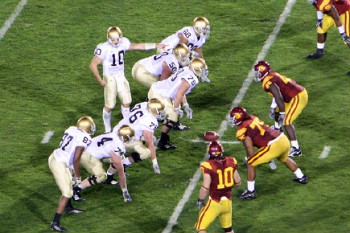 Earlier this week, Brian Dodd published a good post titled Leaders, It’s Time To Take Out The Trash. In it he writes about how Coach Ed Orgeron evaluates defensive linemen. One of the things he looks at is “Does he keep his feet?” “Thing I don’t like is I keep seeing him going to the ground. He’s gotta be able to stay out of the trash.”
Earlier this week, Brian Dodd published a good post titled Leaders, It’s Time To Take Out The Trash. In it he writes about how Coach Ed Orgeron evaluates defensive linemen. One of the things he looks at is “Does he keep his feet?” “Thing I don’t like is I keep seeing him going to the ground. He’s gotta be able to stay out of the trash.”
Brian to continues his post by listing some of the ways he’s seen leaders “going to the ground” and unable “to stay out of the trash” including.
- The majority of your day is spent dealing with high-maintenance people rather than your leaders and top producers.
- People keep coming to you with complaints. They are bringing you THEIR garbage.
- Your day is spent putting out fires rather than advancing the organization’s mission and vision.
- You spend time on the maintenance of people rather than investing in them.
I can certainly relate. To borrow from another football analogy, when faced with these situations it feels like we’re stuck on defense.
I don’t think there’s anything more frustrating in football than when the opposing team methodically drives down the field time and time again. The defense keeps getting pushed back. They just can’t seem to get a turnover or stop them on 3rd down.
As leaders we are motivated by the hope of progress. It’s what gets us out of bed in the morning. So it’s frustrating to expend energy on things in which the best case scenario is not to lose ground.
In fact, if you’re frustrated in your leadership roles these days, take a moment to compare how much time you’re spending on defense to how much time you’re spending on offense. Chances are your frustration is at least in part because you can’t get your defense off the field.
If you are spending most of your time on defense…
It’s time to go on offense!
How?
Start Attacking the Underlying Problems
Each of the situations cited above is a symptom of a larger problem. Instead of sitting back and repeatedly dealing with the symptoms, figure out the underlying causes and make strategic changes to address them.
Don’t resign yourself to spending most of your time dealing with high-maintenance people, talk to them about the things that make them high-maintenance. Work together to find a solution. Let them know that if they don’t do their part to lower their maintenance level, that they’re not going to be able to continue in their current role.
Don’t resign yourself to constantly putting out fires, ask your team, “How can we reduce the number of fires?” And “How can I empower you to put them out on your own?”
But I don’t have time to…
The challenging part about attacking underlying problems is that it takes time and energy. It takes time and energy to address the issue. It takes time and energy to implement solutions. It takes time before the solutions begin to work. It means putting in extra time and effort to do this at the very time we feel frustrated and perhaps overwhelmed from dealing with too many fires, difficult people, etc.
But it’s the only way to get your defense off the field.
Good leadership demands that you get back on offense.
What’s got you playing defense these days? What underlying problems do you need to start attacking today?
Many things cause me to play defense. In fact we have to play defense, so we may as well get good at it.
The key here may be to read the others game plan and blitz at the appropriate time. This can cause a turnover which will get our offense back on the field.
In other words, use to our defense to make the situation safe for others to come to us. Then we can work on the solutions.